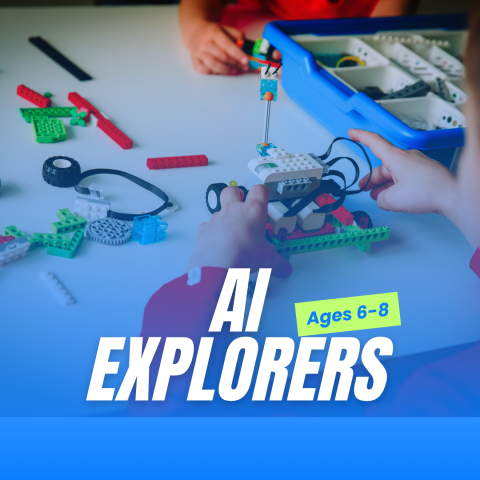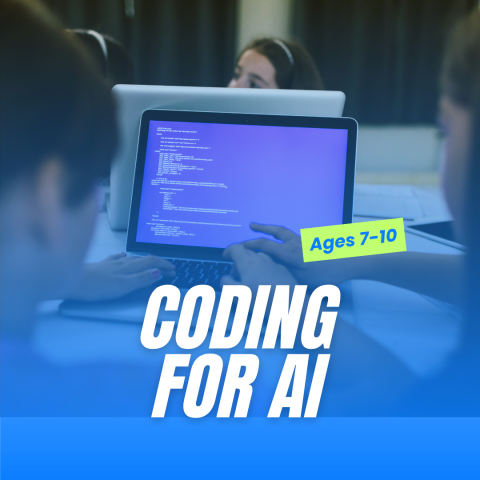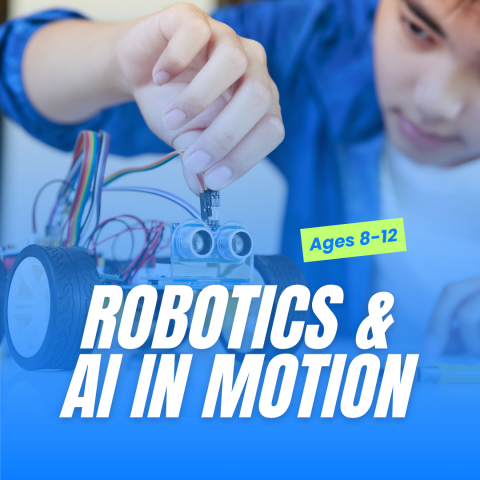Courses

This program introduces kids to AI with voice assistants, storytelling, and activities using ScratchJr. Children will learn the basics of artificial intelligence, engage in interactive projects, and understand how smart machines work. Through guided exercises, they will develop problem-solving skills, creativity, and collaboration abilities.
The program includes hands-on experiences with coding simple tasks on ScratchJr, creating stories that involve AI characters, and exploring the functionalities of voice assistants like Alexa or Google Home. By the end of the program, kids will have a foundational understanding of AI concepts and how they can be applied in everyday life.
Coding for AI: Scratch Projects
Kids use Scratch to create interactive stories and games with logic and creativity.
They learn the basics of programming, such as sequences, loops, and conditionals, by building fun projects.
This program helps develop problem-solving skills and fosters an early interest in technology in a playful and engaging way.


Robotics & AI in Motion
Students use robotic kits to program robots that respond to their environment through sensors and feedback systems.
They will also learn fundamental principles of robotics and artificial intelligence, such as coding, problem-solving, and engineering concepts.
The program aims to foster creativity and critical thinking, while giving students hands-on experience with technology and teamwork. Participants will have the opportunity to engage in various interactive projects, building robots that can perform specific tasks and challenges.
AI Builders: Python for Young Coders
Students learn Python programming by exploring AI basics, training data, and creating their own chatbot or assistant. The program includes hands-on activities, interactive lessons, and collaborative projects to ensure that students grasp key concepts effectively.
By the end of the course, students will have a solid understanding of Python syntax and the fundamentals of artificial intelligence. Additionally, they will develop problem-solving skills and gain experience in designing practical applications.
This program is designed to be engaging and fun, encouraging creativity and curiosity in young learners.


AI for Everyday Life: Ethics, Safety & Creativity
This course instructs children on evaluating AI applications in everyday life and designing solutions with ethical responsibility.
Students will learn about the basics of AI, including how it works and its potential impacts on society.
The program includes hands-on projects where children can create their own simple AI models, discussions about real-world examples of AI use, and lessons on the importance of ethics and safety in technology.
Create with AI: Art, Music & Imagination
Students will use AI to create music, images, and animations, combining creativity with technology.
Participants will explore various AI tools and platforms, learning how to generate original compositions, design digital artwork, and produce animated sequences.
The program aims to foster innovation and critical thinking, allowing students to develop their artistic skills while gaining a deeper understanding of artificial intelligence and its applications in creative fields.


This program introduces kids to AI with voice assistants, storytelling, and screen-free activities using ScratchJr. Children will learn the basics of artificial intelligence, engage in interactive projects, and understand how smart machines work. Through guided exercises, they will develop problem-solving skills, creativity, and collaboration abilities.
The program includes hands-on experiences with coding simple tasks on ScratchJr, creating stories that involve AI characters, and exploring the functionalities of voice assistants like Alexa or Google Home. By the end of the program, kids will have a foundational understanding of AI concepts and how they can be applied in everyday life.

Coding for AI: Scratch Projects
Kids use Scratch to create interactive stories and games with logic and creativity.
They learn the basics of programming, such as sequences, loops, and conditionals, by building fun projects.
This program helps develop problem-solving skills and fosters an early interest in technology in a playful and engaging way.

Robotics & AI in Motion
Students use robotic kits to program robots that respond to their environment through sensors and feedback systems.
They will also learn fundamental principles of robotics and artificial intelligence, such as coding, problem-solving, and engineering concepts.
The program aims to foster creativity and critical thinking, while giving students hands-on experience with technology and teamwork. Participants will have the opportunity to engage in various interactive projects, building robots that can perform specific tasks and challenges.

AI Builders: Python for Young Coders
Students learn Python programming by exploring AI basics, training data, and creating their own chatbot or assistant. The program includes hands-on activities, interactive lessons, and collaborative projects to ensure that students grasp key concepts effectively.
By the end of the course, participants will have a solid understanding of Python syntax and the fundamentals of artificial intelligence. Additionally, they will develop problem-solving skills and gain experience in designing practical applications.
This program is designed to be engaging and fun, encouraging creativity and curiosity in young learners.

AI for Everyday Life: Ethics, Safety & Creativity
This course instructs children on evaluating AI applications in everyday life and designing solutions with ethical responsibility.
Students will learn about the basics of AI, including how it works and its potential impacts on society.
The program includes hands-on projects where children can create their own simple AI models, discussions about real-world examples of AI use, and lessons on the importance of ethics and safety in technology.

Create with AI: Art, Music & Imagination
Students will use AI to create music, images, and animations, combining creativity with technology.
Participants will explore various AI tools and platforms, learning how to generate original compositions, design digital artwork, and produce animated sequences.
The program aims to foster innovation and critical thinking, allowing students to develop their artistic skills while gaining a deeper understanding of artificial intelligence and its applications in creative fields.
This program introduces kids to AI with voice assistants, storytelling, and screen-free activities using ScratchJr. Children will learn the basics of artificial intelligence, engage in interactive projects, and understand how smart machines work. Through guided exercises, they will develop problem-solving skills, creativity, and collaboration abilities.
The program includes hands-on experiences with coding simple tasks on ScratchJr, creating stories that involve AI characters, and exploring the functionalities of voice assistants like Alexa or Google Home. By the end of the program, kids will have a foundational understanding of AI concepts and how they can be applied in everyday life.
Coding for AI: Scratch Projects
Kids use Scratch to create interactive stories and games with logic and creativity.
They learn the basics of programming, such as sequences, loops, and conditionals, by building fun projects.
This program helps develop problem-solving skills and fosters an early interest in technology in a playful and engaging way.
Robotics & AI in Motion
Students use robotic kits to program robots that respond to their environment through sensors and feedback systems.
They will also learn fundamental principles of robotics and artificial intelligence, such as coding, problem-solving, and engineering concepts.
The program aims to foster creativity and critical thinking, while giving students hands-on experience with technology and teamwork. Participants will have the opportunity to engage in various interactive projects, building robots that can perform specific tasks and challenges.
AI Builders: Python for Young Coders
Students learn Python programming by exploring AI basics, training data, and creating their own chatbot or assistant. The program includes hands-on activities, interactive lessons, and collaborative projects to ensure that students grasp key concepts effectively.
By the end of the course, participants will have a solid understanding of Python syntax and the fundamentals of artificial intelligence. Additionally, they will develop problem-solving skills and gain experience in designing practical applications.
This program is designed to be engaging and fun, encouraging creativity and curiosity in young learners.
AI for Everyday Life: Ethics, Safety & Creativity
This course instructs children on evaluating AI applications in everyday life and designing solutions with ethical responsibility.
Students will learn about the basics of AI, including how it works and its potential impacts on society.
The program includes hands-on projects where children can create their own simple AI models, discussions about real-world examples of AI use, and lessons on the importance of ethics and safety in technology.
Create with AI: Art, Music & Imagination
Students will use AI to create music, images, and animations, combining creativity with technology.
Participants will explore various AI tools and platforms, learning how to generate original compositions, design digital artwork, and produce animated sequences.
The program aims to foster innovation and critical thinking, allowing students to develop their artistic skills while gaining a deeper understanding of artificial intelligence and its applications in creative fields.



